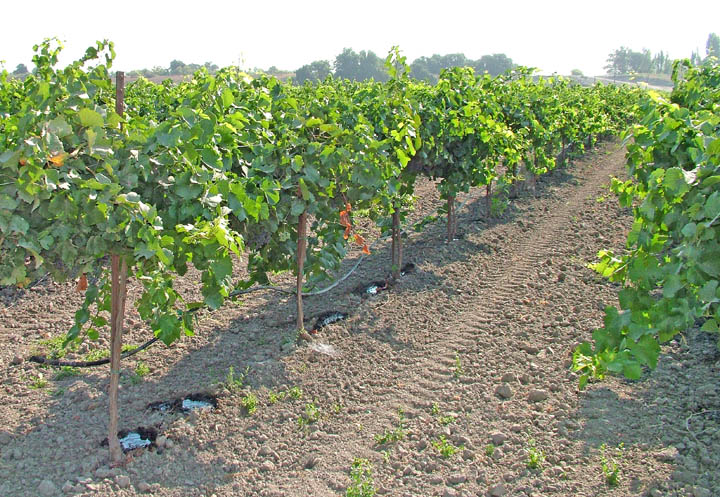July 2, 2012

Nearly half of the 55 unusual wine grape varieties in a plot at the UC Kearney Agricultural Research and Extension Center in Parlier displayed enough promising characteristics to prompt a cooperating vintner to make 25 small lots of wine.
The research at Kearney is designed expand the wine industry’s options in the San Joaquin Valley, currently California’s top grape growing district in terms of production, but lowest in terms of price.
“Most of the popular wine varietals – Merlot, Cabernet Sauvignon, Chardonnay – are at their best in somewhat cooler climates. So we are looking for grapes that make superior fruit in warm climates,” said Matthew Fidelibus, UC Cooperative Extension specialist in the Department of Viticulture and Enology at UC Davis.
Fidelibus is supervising the production at Kearney of wine grape varieties that were collected from countries such as Spain, Greece and Italy, where the climate mimics the valley’s hot days and warm evenings. In the research plot, the vines exhibit a wide range of vigor, productivity and fruit quality.
While Fidelibus is gathering data on each variety’s yield potential, cluster architecture, amenability to mechanization and other viticultural characteristics, winemaker Constellation Brands is monitoring the wine grapes’ potential to produce distinctive, flavorful California wines.
“We need a breakthrough variety,” said Oren Kaye, a research and development winemaker at Constellation Brands. “Many of the wines we produced showed significant promise.”
Currently, 80 percent of California wine is made from fewer than 10 types of wine grapes, with the most popular white being Chardonnay and the most popular red Cabernet Sauvignon.
Kaye says the market is ripe for something new, perhaps Fianio, a white wine with a fresh, young style evoking flavors of melon and grapefruit, or the stylistically unique Marselan Noir, a red wine with bright cherry flavor that pops.
“Millennials own tomorrow,” Kaye said. “They are more accepting of things that are new, as long as it is good. At a restaurant, they think nothing of pulling out a smart phone to look up a wine they haven’t heard of before.”
For Jeannette E. Warnert’s original column, please see here.
You May Also Like




